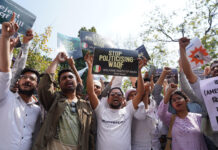The prominent American theologian Shaykh Yasir Qadhi has urged people to stop attacking Hamza Yusuf over controversial comments he made at a recent Islamic conference in Canada.
Dr Qadhi’s comments came after Shaykh Hamza was widely criticised for making comments about race issues as well as political Islam.
Shaykh Hamza also had a dig at Yasir Qadhi for dividing Muslims at the Reviving Islamic Spirit conference in Toronto, for which he later apologised.
But in a Facebook post Yasir Qadhi called attacks on Shaykh Hamza un-Islamic.
He wrote: “Shaykh Hamza Yusuf is one of the most, if not the most, recognizable and respected figures of Islam in the Western world. He is senior to me in age (he embraced Islam while I was still a toddler!), has spent more years preaching and teaching Islam, and has studied Islam in more countries than I have.

“An attack on his persona in light of minor slips is not only unwarranted, it is un-Islamic. We are all humans in the end of the day, but some of us have spent a lifetime of service that should make the rest of us pause before we engage in character assassination.
“It takes a humble man to apologize, and a humble man is a man worthy of respect. ‘Whoever humbles himself for the sake of Allah will be raised up by Allah.’
Subscribe to our newsletter and stay updated on the latest news and updates from around the Muslim world!
“It is clear that some rash statements of mine continue to hurt other people. I must own up and take responsibility for such mistakes of my own. In an earlier, and more overzealous phase of my life, back in the late 90s, and up to the early 00’s, I said some very harsh statements about Sufism in general, and Shaykh Hamza in particular (not to mention other sects and individuals).
“Some of those statements are, sadly, still found online. While I do believe it is clear to all that I have moved on and attempted to make amends, and genuinely strived to achieve Muslim unity as much as possible (especially intra-Sunni unity), I admit that I never explicitly apologized to Shaykh Hamza for those disparaging remarks that I made.
“I therefore unequivocally and unconditionally ask his forgiveness for those remarks. I am not aware of any other remarks I made about him in the recent past that were of a negative nature, but perhaps something has been incorrectly attributed or misunderstood from me. I hold Shaykh Hamza in high regard and believe it is a major sin to malign scholars of our faith. Hence, my apologies, once again.
“While both Sh. Hamza and myself might have slightly different preferences in fiqh, theology and methodology, those differences are within the historic practices of mainstream Sunni ulama and should be respected and tolerated.”






















